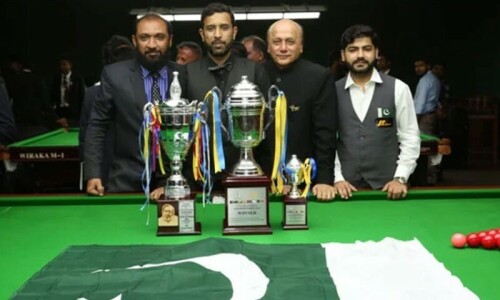RIYADH: Saudi Arabia on Thursday called for the death penalty against five people accused of murdering journalist Jamal Khashoggi inside the kingdom’s Istanbul consulate, but absolved the crown prince of any blame.
Khashoggi, The Washington Post contributor and critic of Crown Prince Mohammed bin Salman, was injected with “a large amount of a drug resulting in an overdose that led to his death” and his body was then dismembered and transferred out of the consulate, the public prosecutor said in a statement.
It was the first Saudi confirmation of how the journalist died, but the prosecutor’s spokesman Shaalan al-Shaalan denied Crown Prince Mohammed bin Salman had any knowledge of the killing.
The prosecutor has requested the death penalty for the five people who “are charged with ordering and committing the crime and for the appropriate sentences for the other indicted individuals”, Shaalan said. He did not identify any of the suspects by name.
Saudi Arabia’s allies and critics alike are pushing for an independent investigation into the murder, with Turkey at their helm.
But Saudi Foreign Minister Adel al-Jubeir on Thursday dismissed Ankara’s request for an international probe. “This is now a legal case and is thus in the hands of Saudi Arabia’s judiciary,” Jubeir told reporters in Riyadh.
In a swift reaction to the prosecutor’s revelations, the United States, a staunch ally of Saudi Arabia, announced it had sanctioned 17 Saudi officials “involved in the abhorrent killing”.
They included Saud Al-Qahtani and Maher Mutreb, key aides to the powerful prince, and Mohammed Alotaibi, who was the consul general in the Istanbul consulate when Khashoggi was murdered. Qahtani, Prince Mohammed’s long-time right-hand man, “was part of the planning and execution of the operation” to kill Khashoggi, the US Treasury said.
Shalaan said Khashoggi’s body parts were handed over to an agent outside the consulate grounds.
Also implicated in the murder is the once-powerful deputy chief of Saudi Arabia’s intelligence, General Ahmed al-Assiri, who gave the order to repatriate Khashoggi, and an unnamed “head of the negotiating team” who flew to the Istanbul consulate and ordered his murder, Shaalan said.
The prosecution said it now has 21 people in custody, 11 of whom have been indicted with investigations to continue into the others.
Assiri and Qahtani, who were both close to royal circles, were fired in the aftermath of the Khashoggi murder. Qahtani has been banned from travel and is now under investigation, the prosecutor’s office said, but did not reveal the fate of Assiri.
“This is clearly an attempt to display to the world that a semblance of accountability is being applied in Riyadh, but the question that has been asked will continue to be asked,” said H.A. Hellyer, senior non-resident fellow at the Atlantic Council and the Royal United Services Institute in London. “Who gave the actual order to these senior officials?”
On Thursday, the Saudi prosecutor’s office said the kingdom had requested that Turkey sign a “special cooperation mechanism” on a probe into the murder.
But Turkey said the Saudi response to the killing was “insufficient” and insisted the murder had been “premeditated.” “We find all those steps positive, but insufficient,” said Turkish Foreign Minister Mevlut Cavusogluo.
The global fallout over the Khashoggi murder has tainted the image of 33-year-old Prince Mohammed — the de facto ruler and heir apparent widely known as MBS — despite the persistent Saudi denials that he was involved.
“The prosecutor’s statement further reinforces that there is no risk whatsoever to MBS’s position,” said Quentin de Pimodan, a consultant at the Greece-based Research Institute for European and American Studies.
“The Saudis will continue to push the narrative that these advisers ‘betrayed the prince’s trust’.”
Published in Dawn, November 16th, 2018

















































Dear visitor, the comments section is undergoing an overhaul and will return soon.